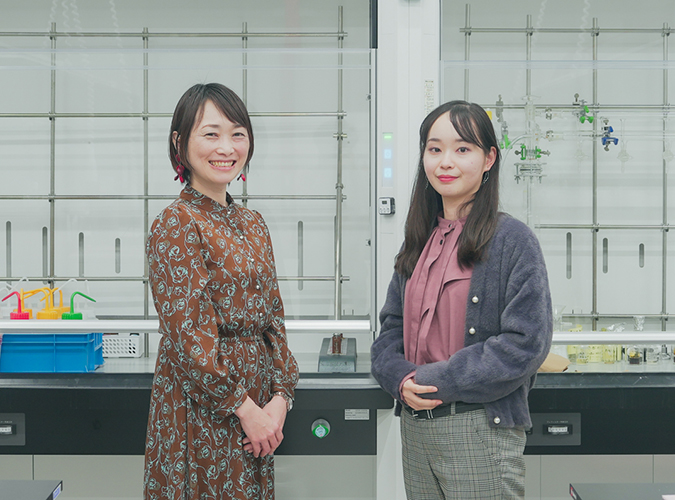150周年記念企画
「未来を拓く青学マインド」
「今の自分」を
信じていざマウンドへ
|校友・卒業生|
東京ヤクルトスワローズ
石川 雅規
×
青山学院大学硬式野球部
常廣 羽也斗/下村 海翔
青山学院は今年、創立150周年を迎えました。学院を巣立った卒業生の多くは、たゆまぬ努力、自ら培った創造性や思考力で夢をかなえ、各界のトップランナーとして活躍を続けています。その一人が、今年44歳を迎えた日本球界現役最年長投手、石川雅規選手です。偉大な先輩の背中を追い掛け、今年ともにドラフト1位でプロ入りする青山学院大学硬式野球部の常廣羽也斗選手、下村海翔選手が、石川選手にプロ野球選手としての心構えや活躍の秘訣を聞きました。
Profile
東京ヤクルトスワローズ
石川 雅規
文学部史学科


秋田市立秋田商業高校から青山学院大学に進み、1999年に大学選手権優勝。日米大学野球代表、シドニー五輪日本代表としても活躍した。大学通算23勝。2002年、自由獲得枠でヤクルトスワローズ(当時)に入団。1年目に12勝を挙げて新人王に輝き、2008年には最優秀防御率、ゴールデングラブ賞を獲得。167㎝の小柄な体で、多彩な変化球と打者を翻弄する投球術を駆使して勝ちを積み重ねる「小さな大投手」。2023年には入団1年目から22年連続勝利を達成。通算185勝(23年シーズン終了時)。左投げ左打ち。
Dialogue

青山学院大学法学部4年 硬式野球部所属
常廣 羽也斗
大分県立大分舞鶴高校から青山学院大学に進学。下村海翔選手と二枚看板でチームを牽引。4年次の全日本大学選手権では明治大学との決勝戦で完封勝利し、18年ぶり5回目の優勝にチームを導くとともにMVP、最優秀投手賞に輝いた。4年次夏には侍ジャパン大学代表として日米大学野球優勝にも貢献。2023年のプロ野球ドラフト会議で広島東洋カープに1位指名を受ける。右投げ右打ち。

青山学院大学コミュニティ人間科学部4年 硬式野球部所属
下村 海翔
九州国際大学付属高校から青山学院大学に進学。1年次秋から東都大学リーグ戦に登板。4年次には常廣選手とともに、チームを33季ぶりの東都大学リーグ戦優勝、全日本大学選手権優勝に導く。4年次夏に侍ジャパン大学代表として出場した日米大学野球ではMVPに輝いた。2023年のプロ野球ドラフト会議で阪神タイガースに1位指名を受ける。右投げ右打ち。
TALK THEME
1st TALK
プロ野球選手の
スタートラインに立って
「まずは今のまま、何も変えず、
自信を持ってやれば大丈夫」

同じ大学からドラフト1位が2人ってすごいよね。最近、青学からピッチャーの後輩がなかなか入って来なかったから、本当に嬉しい。今の気持ちはどう?ドキドキするでしょ?

石川さん

常廣さん
「ドラフト1位」ということで、ちょっと変に持ち上げられている感じはします。

下村さん
よく「活躍する自信はありますか?」って聞かれるんですが、正直、投げてみないと分からないんですよね。
だよね、やってみないと分からないよね。今、「ドラ1だからいいところを見せなきゃ、活躍しなきゃ」って思ってない? 最初は無理しなくて大丈夫。今のまま、何も変えなくていいよ。不安はあるだろうけど、大学時代のピッチングを見ていたら、絶対に大丈夫。自信を持って、今自分が持っているものでまずはやってみた方がいい。キャンプでブルペンに入ると、周りがすごい球を投げるから「もっといい球を投げなきゃ」って焦るかもしれないけど、惑わされないで。プロでもアマでも、野球であることに変わりはないんだから。ただ、プロに入ると、ストライクゾーンは狭くなるよ(笑)。

石川さん

下村さん
全然違いますか?
僕が一番びっくりしたのはそこだね。学生の時はストライクを取ってくれたゾーンなのにボールになることが、結構あると思う。ストライクゾーンは早めにつかんだ方がいいかな。でも、プロって何を投げても打たれそうな気がしない? 絶対コースにビタビタ(ギリギリ)じゃなきゃ、って思っているでしょ?

石川さん
そう思います。

常廣さん

下村さん
そんなことないから、本当に。ど真ん中に投げても、バッターがミスショットすることはあるからね。そこの怖さはなくせるといいよね。

石川さん

常廣さん
大学時代、試合ではほとんどストレートとフォークしか投げていなかったのですが、プロで先発するには、試合で使える球種を増やした方がいいなとは思うんです。ただ、そうすると、今のストレートとフォークの質が落ちるんじゃないかという不安もあって、どちらを優先して練習したらいいのか、今悩んでいます。
さっきも言ったけど、まずは今のスタイルを変えない方がいいと思う。2人は今、球種は何を持っているの?

石川さん

常廣さん
ストレート、カーブ、スライダー、チェンジアップ、フォークです。

下村さん
ストレート、カーブ、スライダー、カットボール、フォーク、チェンジアップ、あとはツーシームも遊びですけど投げます。
めっちゃいっぱいあるじゃん(笑)。いいと思うよ、球種がたくさんあるっていうだけでバッターは嫌なんだよ。僕もシュートを覚えたのは、シュートがあると、左のインコースに真っ直ぐを投げただけで、バッターは「あ、シュートもあるな」と迷うから。プロのピッチャーは、投げなくてもキャンプ中に「今こういうボールを覚えています」って言うこともあるからね。ただし、基本的にインコースにしっかり投げられないとキツいよ、プロは。緩い球もめちゃくちゃ大事。怖がらずにどんどん投げた方がいいと思う。

石川さん

常廣さん
プロに入って最初に大事にした方がいいのは、どんなことですか?
環境に慣れるのが一番かな。それと、けがをしないこと。僕がプロになった時、最初に古田(敦也)さんに教えられたのが、「けがをしない」と「敵を作らない」。「敵を作らない」は、好かれようとするっていうことじゃなくて、誰にでもきちんとあいさつをするとか、社会で当たり前のことを当たり前にするっていうことで、それは青学でもやってきただろうから大丈夫。だからやっぱり、けがをしないのが一番かな。

石川さん

下村さん
けがをしないために、どんなことに気をつけるといいですか?
自分の体や肩肘には、今まで以上に敏感になってほしい。それと、僕の考えだけど、自分のコンディションが良かった時に戻そうとしない方がいいと思う。多分、2人も今までに感覚的に「良かった年」があると思うけど、その時と今は体が違うし、人間は日々変化するから。僕は、良かった時を参考にはするけど、戻そうとはしない。それよりも、今の自分に合ったものを毎日模索している感じかな。

石川さん
2nd TALK
長くプロの世界で
活躍し続けるには?
「野球は“無差別級”。
自分がどんな選手なのかを理解し、
己の戦い方を考える」

石川選手のようにプロの第一線で長く活躍するには、何が必要だと思いますか?

常廣さん

石川さん
やっぱり、長所も短所も含めて「己(おのれ)を知る」っていうことかな。投げていくうちに「この球は通用するけど、これはキツいな」って分かってくると思う。僕は球速が出るわけじゃないから、バッターのタイミングをどうやってずらすかを考えて、変化球の球種を増やしたり、クイックだったり、使えるものを全部使って勝負してきた。
今、トラックマンとかホークアイとか、さまざまなデータを取得する機械があるけど、2人には数字と勝負してほしくはないんだよね。もちろん数字は役に立つ。でも、バッターが打ちづらいタイミングとか、「腕の振りよりも球が来る」みたいなことは、やっぱり数値化できない部分だし、その数値化できないことが勝負を左右するからこそ、僕はプロで生き残ってこられたんだと思う。
僕、身長が174㎝で、大きい方ではないんですが、石川さんは小柄だったことで良かったことはありますか?

下村さん

石川さん
めっちゃめちゃあるよ。体は関係ない。野球って身長や体重にルールがない“無差別級”で、そこで抑えた人が強いし、かっこいい。僕は小さい体で活躍されている先輩方から勇気をもらったし、小さいながら戦っている僕を見て、「勇気をもらった」と感じてくれる人がいてくれたら嬉しい。僕、“気合いと根性大好き。最終的には気持ち”タイプの人間だから、「大きい人に負けたくない」という思いが強いんだよね。そう思ってるでしょ?
ずっと思っています。

下村さん

石川さん
その気持ちは大事にした方がいいよ。それからメンタル、相手の情報、体もすべて含めての準備が大事。僕は試合ですごく緊張するんだけど、「準備をしっかりしているからマウンドに立てる」という感覚がいつもある。
年間143試合もあると、心も体も調子が良い日なんて、年に1試合2試合あるかどうか。だから、そうじゃない時にどうするかが大事なんだよね。やっぱり、いい選手は好不調の波が小さい。小さい波で年間戦える選手が一流だと思う。
去年1年間、調子が良くてしっくりきた試合が1試合もなかったんですけど、今のお話を聞いて、自分だけじゃないんだとホッとしたのと、そういう時でも抑えられる選手がプロで活躍できるんだなと感じました。
さっき石川さんがおっしゃっていたように、コースはアバウトでいいからどんどんストライクゾーンで勝負したい、という理想はあるんですけど、しっくりきてない日は「今日の球だと……」と不安になって、結局ボール先行になり、カウントを悪くして打たれる、ということが多くて。状態があまり良くない日は、石川さんはどんな風に考えて試合に臨んでいるんですか?

下村さん

石川さん
マウンドに上がったら考えてもしょうがないから、割り切るしかないね。さっきも言ったけど、ど真ん中でも打ち損じてくれることもある、と頭のどこかで思っていたら、ちょっと気持ちも楽じゃない?だって、調子が良いからって、抑えられるわけじゃないじゃん? 調子が悪くても、完封しちゃう時もあるでしょ?

常廣さん

下村さん
そうですね。
だから、良くない時にどうするかの引き出しを増やしておくことが大事かな。「このバッターには、長打になるポイントだけは避けよう」とリスクヘッジしたり、ファールをうまく使ってカウントを整える方法を考えたり、いろいろ工夫できるようにしておく。
たまに、オフシーズンにやったことがうまくいって、その年良い結果が出たら、もう「その練習がいいんだ」って思い込んでしまう選手がいるけど、そういう考えだと長くは続けられない、と僕は思っている。その時その時、自分に合うものを考えて、積み重ねていくことが大事。2人とも、チームには尊敬できる先輩がたくさんいらっしゃるから、その人たちから吸収して、5年後、10年後どうなっていたいかを想像しながら自分に合うものを探して、自分の引き出しに入れていってほしいな。
2人は、これから対戦したいバッターはいるの?

石川さん

下村さん
誰か1人っていうのはないんですけど、ゲームで使っていたスター選手に自分が投げることになるので、ちょっと楽しみというか、最初は変な気持ちになるかもしれないですね。
わかる! 僕もそうだった。めっちゃ変な気持ちになったよ。「うわ、古田だ」って思ったもん(笑)。僕が巨人戦で初めて投げた時はすごかったんだよね、相手が。1番仁志さん、2番清水さん、3番高橋由伸さん、4番松井さん、5番清原さん、6番江藤さん、7番二岡さん、8番阿部慎之助さんって、ヤバいでしょ(笑)?「どこでアウト取るの?」って思いながら投げていたよ、最初はね。でも慣れるよ。
そのうち、自分もゲームに出てくるようになるからね。初めてゲームで自分を見たときは、嬉しかったなあ。自分を使うとめっちゃ面白いよ。

石川さん

常廣さん
え、ゲームで自分を、ですか?
使うね、まず。能力も「え、これがG*なの?」とか気になるし。シンカーが本当は2種類あったのに、ゲームでは1種類しかなくて「もっと見てくれよ……」って思ったり。楽しくない?そういうの。
*ゲームで能力値がS~Gなどに分かれGは最低値

石川さん

常廣さん
楽しいですね。

下村さん
石川さんの「カツオカーブ*」、ゲームで使っています。ゲームにも自分の名前が付いた固有球種があるってすごいですよね。
*石川選手のスローカーブは「カツオカーブ」と呼ばれている。「カツオ」は同僚の青木選手に名付けられたニックネーム
名前が付くような変化球、これから2人も作ろうよ!

石川さん
3rd TALK
青山学院大学硬式野球部の
魅力とは?
「自由だからこそ責任がある。
自分で考える練習が
今の自分をつくってくれた」

石川さんは大学時代、安藤寧則監督とも一緒だったとお聞きしていますが、どんな方でしたか?

常廣さん

石川さん
安藤さんは学生コーチで、チームをまとめてサポートしてくれる感じだった。学生の頃から本当に優しかったよ。中野真博コーチは僕が1年生の時の4年生で、すごくかわいがってもらった。
石川さんの頃の善波厚司コーチは、どんな指導をされる方だったんですか?

常廣さん

石川さん
当時はやっぱり「昔ながらの練習」で、めちゃくちゃ走るし、結構追い込む感じ。そういう練習が僕は嫌いじゃなくて、いまだにやることもあるんだけど。まあキツかったけど、コミュニケーションを取りながら楽しくやっていたかな。それがちょうど自分の成長期とも重なって、すごく力になった。善波さんと河原井さん(元監督)がいなかったら、今の僕はない。2人から見て、安藤監督はどんな人?
すごく真面目ですね。

常廣さん

石川さん
曲がったことをすると怒るけど、それ以外は選手に任せてくれるんじゃない?
そうですね。監督に一方的に何かを言われたりすることは一切ないので、すごくやりやすいです。

常廣さん

石川さん
やらされるんじゃなく、自分で考えて練習するのが、昔から青学の野球部のスタイルだよね。全体練習の時間が短いから、妥協しようと思えばいくらでもできるけど、そうならずに、それぞれ自分で考えて必要な練習をする。自由って本当は責任が重くて、責任を持って自分で考えて練習するから身になる。それに、部員が少ないから、僕はチャンスをたくさんいただいたし、同期や先輩、後輩との関係も親密になったな。その環境が自分には合っていたなと思う。当時はグラウンド整備を1年生がやっていたけど、それは今も? 人数が少ないからめちゃくちゃしんどかったでしょ?
やっていました。ただ、内野だけなので……

下村さん

石川さん
え!僕らの頃のグラウンドは外野も全部土だった!だから両手にトンボを持って走っていたよ。今はいいなあ(笑)。
2024年からグラウンドの外野が天然芝から人工芝になるんですよ。

下村さん

石川さん
うそでしょ?! 最高じゃん! 僕らが4年生の時にはまだ相模原キャンパスは、グラウンドも校舎もなかったから、綱島にあった寮から当時の厚木キャンパスまで電車とバスを乗り継いで授業に通ってた。それが遠くてさ、大変だったなあ。
それにしても、最近の青学は箱根駅伝のイメージが強かったけど、去年は野球部が全日本大学選手権で優勝して、ドラ1が2人もいるし、盛り上がってすごく嬉しいね。
そうですね。明治神宮大会の開会式で明治神宮に参拝した時に、「青山学院大学」のプラカードを見た通りがかりの方が「あ、駅伝の大学だ。野球も頑張ってね」とおっしゃって…(笑)。

下村さん

石川さん
「見返したいな」って思った? そういう気持ちは大事だよ。野球部の下級生たちはどう? いい選手がいっぱいいるよね。
ピッチャーは今1年生の鈴木泰成がすごくいいです。

下村さん

石川さん
東海大菅生高校出身の? そうなんだ。次のエースは左の児玉悠紀君?
そうです。あとは2年生のヴァデルナ投手。スライダーが見たことないぐらい曲がるんですよ。

下村さん

石川さん
いいなあ、そのスライダーを教えてほしい。
バッティングは西川史礁がいるし、強くなると思います。

常廣さん

石川さん
西川君、パンチ力があるよね。1年生から試合に出ていた佐々木泰君もいいんじゃない?これから楽しみだな。
今年の成績で注目度が一気に上がりましたし、良い選手がたくさんいるので、期待しています。

下村さん

石川さん
もちろん、常廣君と下村君のプロでの活躍も楽しみ。2人とも強いチームに入って、チャンスはあるからね。同じセ・リーグだから対戦も多いと思うし、打席に入ったら、打っちゃおうかなー(笑)。……いや、打てないと思うけど、どういう球を投げるのか、打席から自分の目で見たいよね。2人は僕からヒットは打たないでね、バントはいいけど(笑)
早く石川さんと投げ合えるように頑張ります。

常廣さん

下村さん

石川さん
投げ合いたいなあ。それには僕の方も頑張らないとだな(笑)























